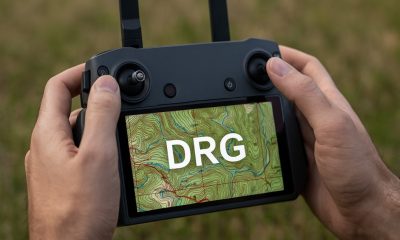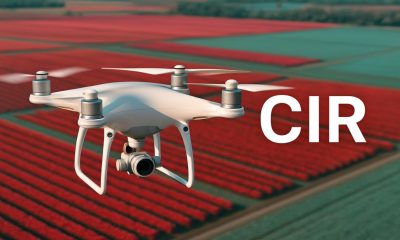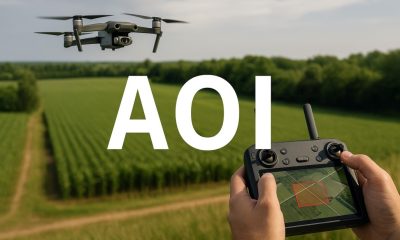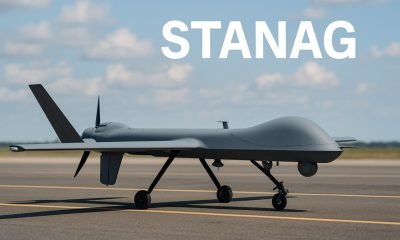- Acronym Guide
- AAM
- ABS
- AC
- ACAS
- ADS-B
- AFAC
- AGL
- AI
- AIM
- ALS
- AM
- AMA
- ANSP
- AOI
- APPI
- AUV
- AUVSI
- ARPAS-UK
- ASTM
- ATC
- BVLOS
- CAA
- CAAC
- CAB
- CASA
- CATT
- CBO
- CBR
- CBRN
- CDMA
- CDR
- CFR
- CIR
- COA
- COMINT
- CORS
- COTP
- COTR
- CPTED
- CV
- C2
- DAA
- DEM
- DFI
- DFS
- DGCA
- DHS
- DOD
- DPA
- DPEs
- DRG
- DRO
- DSM
- DSMX
- DSP
- DSSS
- DTM
- EASA
- EFT
- EO
- EOD
- EO/IR
- ELINT
- EMI
- ESC
- EVLOS
- eVTOLs
- FAA
- FCC
- FCS
- FHSS
- FICCI
- FLIR
- FOB
- FOV
- FPS
- FPV
- GBDAA
- GCP
- GCS
- GDPR
- GML
- GNSS
- GPS
- GSD
- GVC
- HDR
- HOGE
- IACRA
- ICAO
- ICS
- IMU
- INS
- IR
- ISA
- ISR
- ITU
- JARUS
- LAAMS
- LAANC
- LAATM
- LAI
- LBA
- LIDAR
- LOS
- LSALT
- MAC
- MAVLink
- MLIT
- MMS
- MSL
- MTOM
- NDAA
- NCSL
- NFZ
- NIST
- NMEA
- NOTAM
- NPA
- NPRM
- NTIA
- OBIA
- OEM
- OFDM
- OOP
- PASM
- PAV
- PCV
- PdM
- PEC
- PIC
- PID
- PIPL
- PLD
- PM
- PN
- PPK
- PPS
- PSM
- PWM
- UAM
- UAOP
- UAS
- UASTM
- UAV
- UCAVs
- UHD
- UHF
- USV
- UTM
- RAIM
- RCC
- RCS
- RFI
- ReOC
- RePL
- RMS
- ROI
- RPAS
- RPC
- RTH
- RTK
- SaR
- SAR
- SARP
- SBAS
- S.Bus
- SBIR
- SEDENA
- SfM
- SFOC
- SIGINT
- SLAM
- SMS
- SORA
- STANAG
- STTR
- sUAS
- TCAS
- TCCA
- TFR
- TIN
- TOF
- TP
- TPS
- TSA
- VHF
- VLOS
- VTOL
Drone Acronyms
What is CATT (Certificat d’Aptitude Théorique de Télépilote)?
By
Jacob StonerTable Of Contents

Definition
The Certificat d’Aptitude Théorique de Télépilote (CATT), or Theoretical Competency Certificate for Remote Pilots, is a certification required in France for drone operators engaging in certain types of professional drone operations. This theoretical certification ensures that remote pilots possess a solid understanding of aviation regulations, airspace management, meteorology, and other relevant topics necessary for safe and compliant drone operation.
Usage
The CATT certification is mandatory for professional drone pilots in France who operate under specific regulatory categories, such as BVLOS (Beyond Visual Line of Sight) flights or missions in controlled airspace. To obtain the CATT, pilots must pass a theoretical exam administered by the French Civil Aviation Authority (DGAC). This certification ensures that remote pilots have the foundational knowledge required to safely integrate into French airspace.
Relevance to the Industry
For commercial drone operators in France, the CATT is essential for legally conducting more complex operations. The certification demonstrates that pilots have the theoretical knowledge to comply with airspace regulations and manage potential risks, contributing to safer skies as drone usage increases in professional settings, such as infrastructure inspection, agriculture, and filmmaking.
How Does the Certificat d’Aptitude Théorique de Télépilote (CATT) Work?
Exam Preparation and Requirements:
- Understanding the Exam Scope:
- DGAC Curriculum and Study Materials: The CATT certification is overseen by the Direction Générale de l’Aviation Civile (DGAC), which provides guidelines on the subjects covered in the theoretical exam. These include fundamental aviation principles, airspace regulations, flight safety, weather interpretation, and aerodynamics specific to drone operations. Candidates need to familiarize themselves with these topics, as the exam assesses both knowledge and understanding required for safe drone operations.
- Study Resources and Training Courses: To prepare, candidates often use study materials approved by the DGAC or enroll in preparatory courses offered by aviation schools. These courses are designed to cover each topic in detail, with practice exams, tutorials, and guidance tailored to ensure candidates meet the DGAC’s standards.
- Exam Structure and Content:
- Multiple-Choice Format: The CATT exam is typically presented in a multiple-choice format. Questions cover critical areas like identifying airspace restrictions, understanding meteorological reports, and managing emergency situations. The multiple-choice questions test theoretical knowledge in a practical context, ensuring that pilots are prepared to make informed decisions during flight operations.
- Specific Topics: Key topics include:
- Airspace Classification: Knowledge of controlled, restricted, and danger zones within French airspace.
- Meteorology: Basics of interpreting weather patterns, as these impact flight stability and safety.
- Flight Regulations: Familiarity with regulations related to both manned and unmanned aircraft, including communication requirements and safety protocols.
- Human Factors and Safety Protocols: Pilots must understand the limits of human performance, risk mitigation techniques, and emergency response procedures.
Certification Process and Practical Application:
- Exam Registration and Completion:
- Applying for the Exam: Candidates can register for the CATT exam at designated testing centers authorized by the DGAC. The registration process includes submitting personal identification details, as well as any prerequisites specified by the DGAC.
- Passing Score and Reattempts: Candidates must achieve a passing score to receive their CATT certification. If unsuccessful, they are allowed to retake the exam, with specific limits on the number of attempts and waiting periods between them. Successfully passing the exam confirms that the candidate has the theoretical knowledge needed for safe drone operations.
- Practical Implications of the CATT:
- Foundation for Practical Skills: While the CATT is a theoretical certification, it lays the groundwork for safe and responsible drone operation. In many cases, holding a CATT is a prerequisite for more advanced drone certifications that include practical assessments, such as those for Beyond Visual Line of Sight (BVLOS) flights.
- Compliance and Legal Operation: The CATT certification demonstrates compliance with French aviation laws for drone operations, especially for commercial activities. Certified drone pilots can legally operate under the regulations set by the DGAC, which allows for more complex missions, such as flying in controlled airspace or for professional applications like filmmaking, inspection, and surveying.
By covering theoretical knowledge on aviation, meteorology, and airspace regulations, the Certificat d’Aptitude Théorique de Télépilote (CATT) equips remote pilots in France with essential information for safe, legal, and responsible drone operations.
Example in Use
“Before conducting aerial surveys in controlled airspace, the drone operator secured their CATT certification, confirming their theoretical knowledge of French aviation laws and safe operational practices.”
Frequently Asked Questions about CATT (Certificat d’Aptitude Théorique de Télépilote)
1. Who needs a CATT certification in France?
Answer: Professional drone pilots who engage in operations like BVLOS flights or flying in controlled airspace are required to obtain a CATT to ensure they are knowledgeable in airspace regulations and safety protocols.
2. What topics are covered in the CATT exam?
Answer: The CATT exam includes topics such as:
- Aviation Regulations: Understanding the rules and requirements for safe drone operation.
- Airspace Management: Knowledge of different airspace classes and restrictions.
- Meteorology and Aerodynamics: Basic principles that impact drone flight stability and safety.
3. How does one obtain a CATT certification?
Answer: To obtain the CATT, candidates must:
- Prepare for the Theoretical Exam: Study aviation-related topics required by the DGAC.
- Pass the Exam: Successfully complete the theoretical test, demonstrating their knowledge of key subjects necessary for safe drone operations.
For examples of these acronyms visit our Industries page.
As the CEO of Flyeye.io, Jacob Stoner spearheads the company's operations with his extensive expertise in the drone industry. He is a licensed commercial drone operator in Canada, where he frequently conducts drone inspections. Jacob is a highly respected figure within his local drone community, where he indulges his passion for videography during his leisure time. Above all, Jacob's keen interest lies in the potential societal impact of drone technology advancements.











